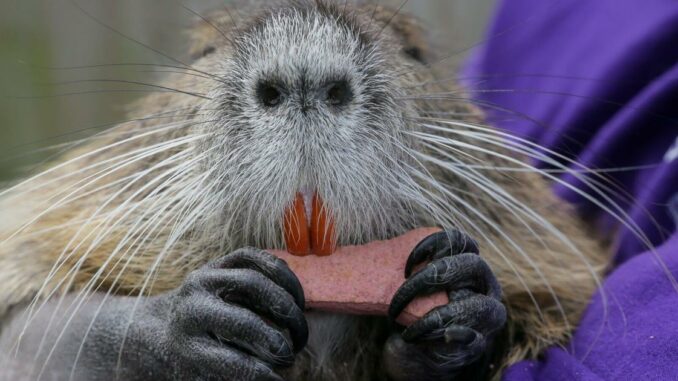
When state wildlife agents announced they’d seize a Bucktown couple’s pet nutria, it sparked questions about the legality of domesticated wildlife.
On the subject of possessing a nutria, state law is pretty clear: “Nutria shall not be relocated and shall be euthanized within 12 hours of capture.”
In short, if you catch it, you’ve got to kill it.
That’s because nutria are an outlaw species in Louisiana. The big, orange-toothed rodents were brought to Louisiana from South America for the fur trade in the 1930s. When the fur market tanked, nutria were released into the wild, where they thrived at the expense of the state’s fragile wetlands. Unlike Louisiana’s native muskrats, which eat plant tops, nutria gnaw away the roots, leaving little to hold the soil in place.
Myra Lacoste wipes away tears as she and her husband, Denny, are confronted by Louisiana Wildlife and Fisheries agents seeking to seize their pet nutria, Neuty, at their Bucktown home on Thursday, March 16, 2023.
Nutria have converted more than 40 square miles of the coast into open water in recent decades, according to state Department of Wildlife and Fisheries estimates. That’s equivalent to losing five Grand Isles.
They also eat the eggs of ground-nesting birds and cause trouble for flood-control levees, which can be undermined when nutria burrow into them.
But what if you take home a seemingly harmless nutria baby? That appears to have been the case with Denny and Myra Lacoste, who found the nutria they named “Neuty” after passing cars near a Metairie canal killed its mother and left it an orphan.
State law is also clear on this instance. It says to leave the animal alone, whether it’s a orphaned duck, a broken-legged alligator, or a sad, lonely-looking nutria – unless you have a license.
“It shall be unlawful for any person to keep, hold or possess in captivity any sick, injured or orphaned wildlife (except fish) or otherwise engage in wildlife rehabilitation without first obtaining at no charge, a LDWF Wildlife Rehabilitation Permit,” Louisiana law says.
Most cities and other local jurisdictions also prohibit taking pets from the wild. A New Orleans ordinance says “no person shall keep or permit to be kept any wild, or exotic animal as a pet.”

A nutria sits along Tarpaper Canal in Barataria Preserve near Estelle on March 13, 2022.
Some cities, like Baton Rouge, can issue temporary permits for people keeping injured or baby wild animals, but the intent is temporary care rather than long-term co-habitation.
Wildlife and Fisheries doesn’t typically look for violators of wild animal possession laws. But it’s hard to ignore rule-breaking when it’s splashed across a newspaper. This week, a Times-Picayune story profiled Neuty’s life with the Lacoste family, prompting followup stories by TV stations and other media outlets.
“If we see it, we have to act on it,” said Ed Pratt, a Wildlife and Fisheries spokesperson. “If an agent was on patrol and saw a nutria sitting with somebody on a porch, we’d have to stop. That’s breaking the law.”
Agents also recently felt compelled to act after a Patterson man posted social media videos of himself cutting the tails off live nutria and releasing the injured animals into the wild. Cruelty to animals – even outlaw ones – is also illegal.
Wildlife experts say there are many reasons why attempting to make wild animals into pets is a bad idea.
Humans don’t typically know how to properly feed or care for wild animals, sometimes causing suffering and illness. While humans have bred dogs, cats and livestock for for thousands of years, wild animals don’t know how to navigate domestic life, and may turn on their owners, even after years of living together. Born Free USA, a nonprofit group opposed to wild animal ownership, has documented more than 1,500 attacks, including more than 75 human deaths, involving wildlife pets over the past 20 years.

Denny Lacoste rescued a wounded baby nutria two years ago and named it Neuty. The creature, now a beloved family pet weighing 22 pounds, relaxes at Lacoste’s Bucktown home with Moose the dog on Monday, March 13, 2023.
Wild animals also carry a host of diseases and parasites that can be spread to people and pets. Some, like rabies, can kill people.
Nutria are particularly worrisome. According to the U.S. Department of Agriculture, nutria can carry tuberculosis and septicemia, a bacterial blood poison. Nutria poop and pee can contain several types of gut-eating parasites: blood flukes, liver flukes, eelworms and tapeworms, all of which can spread through water, including the backyard pool Neuty regularly used.
Also raising concerns of possible disease and parasite transmission: Neuty’s regular fraternization with the family dog and his trips with Denny Lacoste to the seafood shop he owns near Clearview Parkway.
Wildlife and Fisheries has arranged for Neuty to live at the Baton Rouge Zoo, where he would be part of an educational exhibit, Pratt said.
While initially agreeing to cooperate with agents, the Lacostes appear to have changed their minds. On Friday morning, an agent was met by the family’s lawyer when he arrived at a Metairie business to take Neuty away.



Leave a Reply